百事公司英文介绍
百事可乐英文广告词
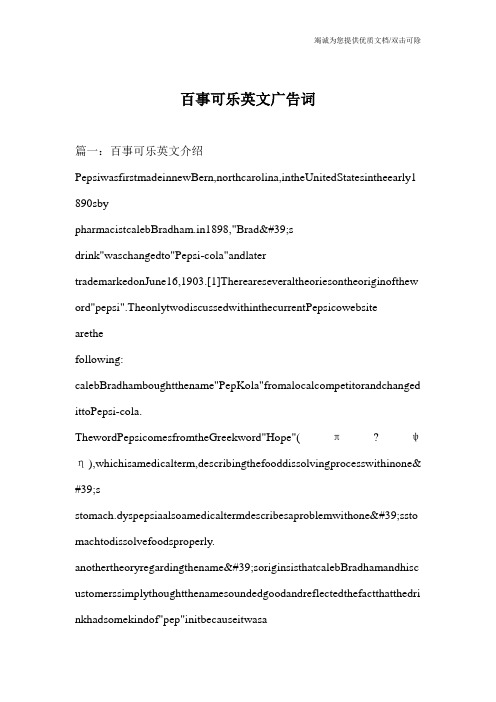
百事可乐英文广告词篇一:百事可乐英文介绍PepsiwasfirstmadeinnewBern,northcarolina,intheUnitedStatesintheearly1 890sbypharmacistcalebBradham.in1898,"Brad's drink"waschangedto"Pepsi-cola"andlatertrademarkedonJune16,1903.[1]Thereareseveraltheoriesontheoriginofthew ord"pepsi".TheonlytwodiscussedwithinthecurrentPepsicowebsite arethefollowing: calebBradhamboughtthename"PepKola"fromalocalcompetitorandchanged ittoPepsi-cola. ThewordPepsicomesfromtheGreekword"Hope"(π?ψη),whichisamedicalterm,describingthefooddissolvingprocesswithinone& #39;sstomach.dyspepsiaalsoamedicaltermdescribesaproblemwithone'ssto machtodissolvefoodsproperly.anothertheoryregardingthename'soriginsisthatcalebBradhamandhisc ustomerssimplythoughtthenamesoundedgoodandreflectedthefactthatthedri nkhadsomekindof"pep"initbecauseitwasacarbonateddrink.itwasmadeofcarbonatedwater,sugar,vanilla,rareoils,andkolanuts.whetherth eoriginalrecipeincludedtheenzymepepsinisdisputed.[2][3]in1903,BradhammovedthebottlingofPepsi-colafromhisdrugstoreintoarente dwarehouse.Thatyear,Bradhamsold7,968gallonsofsyrup.Thenextyear,Peps iwassoldinsix-ouncebottles,andsalesincreasedto19,848gallons.in1924,Pep sireceiveditsfirstlogoredesignsincetheoriginaldesignof1905.in1926,thelog owaschangedagain.in1929,automobileracepioneerBarneyoldfieldendorsed Pepsi-colainnewspaperadsas"abullydrink...refreshing,invigorating,afinebracer篇二:百事可乐广告语百事可乐历年广告语:1898年清爽、可口,百事可乐1903年提神、爽心、增进消化1905年可口之饮料1906年天然饮料——百事可乐1907年百事可乐:可口、健康1909年百事可乐:使你才气焕发1910年喝百事可乐,让你心满意足1923年这就是健康:百事可乐品尝百事,你将喜欢它1928年百事可乐,激励你的士气1932年一样的价格,双倍的享受1939年一样的价,双倍的量1940年百事可乐是属于你的饮料1943年令人诱惑的口味1945年百事可乐:更多、更好1949年口味最好、花钱更少1950年量多、活力更多1953年清新、爽口1958年爱社交,喝百事喝百事,增友谊1959年百事可乐令你心旷神怡1961年这就是百事,它属于年轻的心1963年奋起吧,你就属于百事新一代1964年让自己充满活力,你是百事新一代1967年口味独一无二,百事可乐向前涌动品尝无可比拟的百事1969年生活/奉献你从生活中获取,百事从奉献中获取1971年拥有一个百事的日子1973年成为百事人,感受自由心1975年百事挑战,让你的感觉来决定1976年拥有百事时代1979年把握百事精神,赋予百事挑战1982年喝百事可乐,享受一生美味啊!百事的时代1983年现在就去体会百事1984年百事可乐,新一代的选择1987年百事可乐:美国的选择1990年亲爱的,这就是您所需要的1992年不能没有它——百事可乐1993年年轻、开心,喝百事1995年百事之外,别无选择1996年改变新的一页:百事可乐1998年新一代的选择Thechoiceofanewgeneration渴望无限(askformore)1999年百事,渴望无限快乐的可乐20XX年百事,这就是可乐20XX年突破渴望(dareformore)敢于第一(daretoBeno.1)20XX 年突破创造发现more20XX年全民携手舞动中国20XX年欢聚时刻共享百事篇三:百事可乐和可口可乐广告词()两者的广告词关于可口可乐1927在任何一个角落.1929世界上最好的饮料.1932太阳下的冰凉.1933一扫疲惫,饥渴.1937美国的欢乐时光.1938口渴不需要其它1939只有可口可乐.1940最易解你渴.1942只有可口可乐才是可口可乐,永远只买最好的.1945充满友谊的生活,幸福的象征.1947可口可乐的品质,是你永远信赖的朋友.哪里好客,哪里就有可乐. 1950口渴同样追求品质.1951好客与家的选择.1952你想要的就是可乐.1955就像阳光一样带来振奋.1957好品质的象征.1958清凉,轻松喝可乐.1959可口可乐的欢欣人生,真正的活力.1961可口可乐,给你带来最佳状态.1963有可乐相伴你会事事如意.1964可口可乐给你虎虎生气,特别的活力.1965充分享受可口可乐.喝了可口可乐,你再也不会感到疲倦.1968一波又一波,一杯又一杯.1970这才是真正的,这才是地道货,可口可乐真正令你心旷神怡. 1971我愿拥有可乐的世界.1975俯瞰美国,看我们得到了什么?1976可乐加生活.1980一杯可乐,一个微笑.1982这就是可口可乐.1985一踢;一击;可口可乐.1989挡不住的感觉!1993永远是可口可乐.2000心在跳!我们努力活出真精彩! 20XX激情在此燃烧关于百事可乐1898年清爽、可口,百事可乐1903年提神、爽心、增进消化1905年可口之饮料1906年天然饮料——百事可乐1907年百事可乐:可口、健康1909年百事可乐:使你才气焕发1910年喝百事可乐,让你心满意足1923年这就是健康:百事可乐品尝百事,你将喜欢它1928年百事可乐,激励你的士气1932年一样的价格,双倍的享受1939年一样的价,双倍的量1940年百事可乐是属于你的饮料1943年令人诱惑的口味1945年百事可乐:更多、更好1949年口味最好、花钱更少1950年量多、活力更多1953年清新、爽口1958年爱社交,喝百事喝百事,增友谊1959年百事可乐令你心旷神怡1961年这就是百事,它属于年轻的心1963年奋起吧,你就属于百事新一代1964年让自己充满活力,你是百事新一代1967年口味独一无二,百事可乐向前涌动品尝无可比拟的百事1969年生活/奉献你从生活中获取,百事从奉献中获取1971年拥有一个百事的日子1973年成为百事人,感受自由心1975年百事挑战,让你的感觉来决定1976年拥有百事时代1979年把握百事精神,赋予百事挑战1982年喝百事可乐,享受一生美味啊!百事的时代1983年现在就去体会百事1984年百事可乐,新一代的选择1987年百事可乐:美国的选择1990年亲爱的,这就是您所需要的1992年不能没有它——百事可乐1993年年轻、开心,喝百事1995年百事之外,别无选择1996年改变新的一页:百事可乐1998年新一代的选择Thechoiceofanewgeneration渴望无限(askformore)1999年百事,渴望无限快乐的可乐20XX年百事,这就是可乐20XX年突破渴望(dareformore)敢于第一(daretoBeno.1)。
百事公司简介
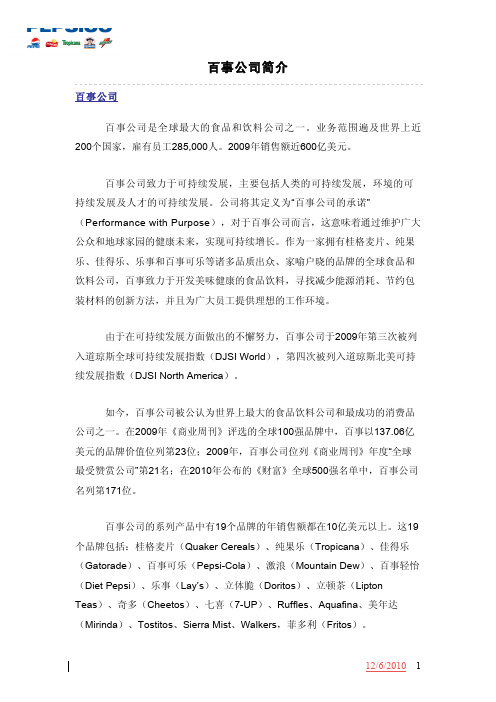
百事公司简介百事公司百事公司是全球最大的食品和饮料公司之一。
业务范围遍及世界上近200个国家,雇有员工285,000人。
2009年销售额近600亿美元。
百事公司致力于可持续发展,主要包括人类的可持续发展,环境的可持续发展及人才的可持续发展。
公司将其定义为“百事公司的承诺”(Performance with Purpose),对于百事公司而言,这意味着通过维护广大公众和地球家园的健康未来,实现可持续增长。
作为一家拥有桂格麦片、纯果乐、佳得乐、乐事和百事可乐等诸多品质出众、家喻户晓的品牌的全球食品和饮料公司,百事致力于开发美味健康的食品饮料,寻找减少能源消耗、节约包装材料的创新方法,并且为广大员工提供理想的工作环境。
由于在可持续发展方面做出的不懈努力,百事公司于2009年第三次被列入道琼斯全球可持续发展指数(DJSI World),第四次被列入道琼斯北美可持续发展指数(DJSI North America)。
如今,百事公司被公认为世界上最大的食品饮料公司和最成功的消费品公司之一。
在2009年《商业周刊》评选的全球100强品牌中,百事以137.06亿美元的品牌价值位列第23位;2009年,百事公司位列《商业周刊》年度“全球最受赞赏公司”第21名;在2010年公布的《财富》全球500强名单中,百事公司名列第171位。
百事公司的系列产品中有19个品牌的年销售额都在10亿美元以上。
这19个品牌包括:桂格麦片(Quaker Cereals)、纯果乐(Tropicana)、佳得乐(Gatorade)、百事可乐(Pepsi-Cola)、激浪(Mountain Dew)、百事轻怡(Diet Pepsi)、乐事(Lay’s)、立体脆(Doritos)、立顿茶(Lipton Teas)、奇多(Cheetos)、七喜(7-UP)、Ruffles、Aquafina、美年达(Mirinda)、Tostitos、Sierra Mist、Walkers,菲多利(Fritos)。
百事公司简介
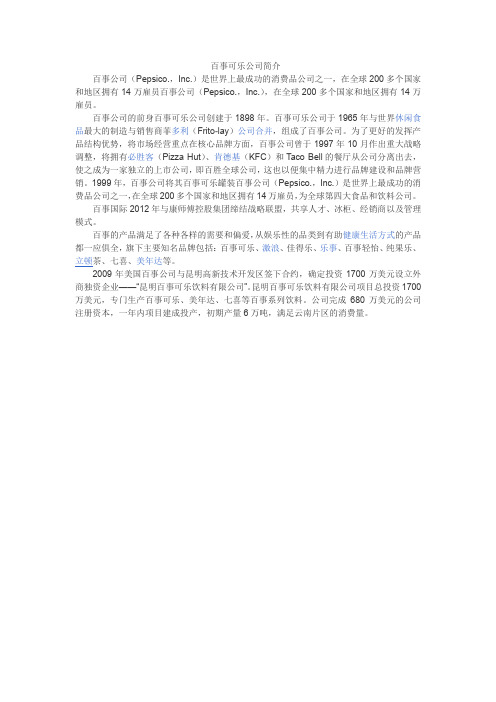
百事可乐公司简介
百事公司(Pepsico.,Inc.)是世界上最成功的消费品公司之一,在全球200多个国家和地区拥有14万雇员百事公司(Pepsico.,Inc.),在全球200多个国家和地区拥有14万雇员。
百事公司的前身百事可乐公司创建于1898年。
百事可乐公司于1965年与世界休闲食品最大的制造与销售商菲多利(Frito-lay)公司合并,组成了百事公司。
为了更好的发挥产品结构优势,将市场经营重点在核心品牌方面,百事公司曾于1997年10月作出重大战略调整,将拥有必胜客(Pizza Hut)、肯德基(KFC)和Taco Bell的餐厅从公司分离出去,使之成为一家独立的上市公司,即百胜全球公司,这也以便集中精力进行品牌建设和品牌营销。
1999年,百事公司将其百事可乐罐装百事公司(Pepsico.,Inc.)是世界上最成功的消费品公司之一,在全球200多个国家和地区拥有14万雇员,为全球第四大食品和饮料公司。
百事国际2012年与康师傅控股集团缔结战略联盟,共享人才、冰柜、经销商以及管理模式。
百事的产品满足了各种各样的需要和偏爱,从娱乐性的品类到有助健康生活方式的产品都一应俱全,旗下主要知名品牌包括:百事可乐、激浪、佳得乐、乐事、百事轻怡、纯果乐、立顿茶、七喜、美年达等。
2009年美国百事公司与昆明高新技术开发区签下合约,确定投资1700万美元设立外商独资企业——“昆明百事可乐饮料有限公司”。
昆明百事可乐饮料有限公司项目总投资1700万美元,专门生产百事可乐、美年达、七喜等百事系列饮料。
公司完成680万美元的公司注册资本,一年内项目建成投产,初期产量6万吨,满足云南片区的消费量。
百事介绍ppt
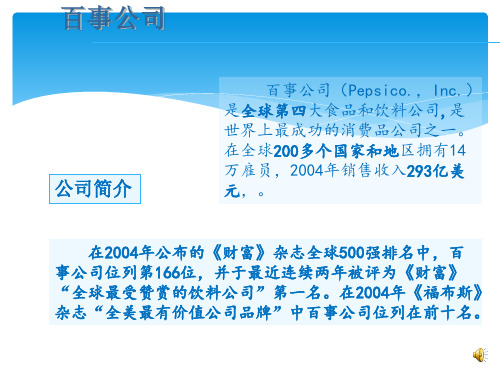
百事品牌的理念是“渴望无限”,倡导年轻人积 极进取的生活态度,寓意是对年轻人来说,机会和理 想有着无限多的空间,他们可以尽情地遐想和追求。 为了推广这一理念,百事选择足球和音乐作为品 牌基础和企业文化载体,在广告和社会公益活动中借 助杰克逊、“小甜甜”布兰妮、郭富城、王菲、陈慧 琳、郑秀文、周杰伦、贝克汉姆、里瓦尔多、卡洛斯、 范志毅、李玮峰、祁宏等一大批明星作为品牌代言人, 极力倡导企业文化所提倡的精神,使百事的“新一代 的选择”和推崇“快乐自由”的风格广泛地被人们尤 其是青年人的理解和接受。
1889年北卡罗来纳州的药剂师Caleb Bradham发明了百事可乐,并称这种 饮料能治疗消化不良,百事可乐早在1948年便开始生产罐装软饮料。70至80年 代,百事的销售逐年递增,与对手可口可乐之间的竞争达到白热化程度。80年 代中期“品味挑战”的成功使百事暂时跃居行业第一,但随后百事又回到了第 二的位置,并且持续今。
(Pizza Hut)、肯德基(KFC)和 Taco Bell的餐厅从公司分离出去,使 之成为一家独立的上市公司,即百胜 全球公司(Tricon Global,现公司名 为YUM!)。
1999年,百事公司将其百事可乐
罐装集团(PBG)分离上市,以便集 中精力进行品牌建设和品牌营销。
2000年,百事公司将以制造水果混 合型饮料、能量饮料、乳品饮料、茶饮 料和含有植物成分的SoBe饮料业务纳入 公司业务范围,并开拓一系列新型饮料 产品 2001年,百事公司获得美国联邦贸 易委员会无条件批准,以134亿美元成功 收购世界著名的桂格(Quaker Oats Company)公司,一跃成为全球非碳酸 饮料行业的冠军。
公司简介
百事公司(Pepsico.,Inc.) 是全球第四大食品和饮料公司,是 世界上最成功的消费品公司之一。 在全球200多个国家和地区拥有14 万雇员,2004年销售收入293亿美 元,。
百事简介

关于百事公司作者:sun 2010-10-27 14:37百事公司是全球最大的食品和饮料公司之一。
业务范围遍及世界上近200个国家,雇有员工285,000人。
2009年销售额近600亿美元。
百事公司致力于可持续发展,主要包括人类的可持续发展,环境的可持续发展及人才的可 ..百事公司是全球最大的食品和饮料公司之一。
业务范围遍及世界上近200个国家,雇有员工285,000人。
2009年销售额近600亿美元。
百事公司致力于可持续发展,主要包括人类的可持续发展,环境的可持续发展及人才的可持续发展。
公司将其定义为“目的性绩效”(Performance with Purpose),对于百事公司而言,这意味着通过维护广大公众和地球家园的健康未来,实现可持续增长。
作为一家拥有桂格麦片、纯果乐、佳得乐、乐事和百事可乐等诸多品质出众、家喻户晓的品牌的全球食品和饮料公司,百事致力于开发美味健康的食品饮料,寻找减少能源消耗、节约包装材料的创新方法,并且为广大员工提供理想的工作环境。
与此同时,百事在全球市场设计开发符合当地口味的产品,同当地的农民、政府部门和社区团体建立伙伴关系,以体现对所在社区的尊重和支持,并为社区的发展投入力量。
由于在可持续发展方面做出的不懈努力,百事公司于2009年第三次被列入道琼斯全球可持续发展指数(D JSI World),第四次被列入道琼斯北美可持续发展指数(DJSI North America)。
如今,百事公司被公认为世界上最大的食品饮料公司和最成功的消费品公司之一。
在2009年《商业周刊》评选的全球100强品牌中,百事以137.06亿美元的品牌价值位列第23位;2009年,百事公司位列《商业周刊》年度“全球最受赞赏公司”第21名;在2010年公布的《财富》全球500强名单中,百事公司名列第171位。
百事公司的系列产品中有19个品牌的年销售额都在10亿美元以上。
这19个品牌包括:桂格麦片(Quak er Cereals)、纯果乐(Tropicana)、佳得乐(Gatorade)、百事可乐(Pepsi-Cola)、激浪(Mountai n Dew)、百事轻怡(Diet Pepsi)、乐事(Lay’s)、立体脆(Doritos)、立顿茶(Lipton Teas)、奇多(Cheetos)、七喜(7-UP)、Ruffles、Aquafina、美年达(Mirinda)、Tostitos、Sierra Mist、Walk ers,菲多利(Fritos)。
百事可乐

⒊重点突破的销售策略
• 百事可乐在各城市的市场 • 针对可口可乐的大打广告 表现,两极分化明显,市 牌,百事可乐将人力、财 场渗透率高者甚至超过可 力和物力集中在几个重点 口可乐,而低者不足可口 城市,大肆进行立体式广 可乐的40%.这也恰恰是百 告宣传进攻,所选择的重 事可乐近期所希望看到的 点是这些大城市中的高校、 结果,因为他们的目的就 名校。年轻人中消费力较 是抓住可口可乐满天撒网 高的就是学生。因此,百 战略的弱点,集中优势兵 事可乐在高校内设立自动 力实施中心突破,并终于 售货机,出资建立公共设 施等——抓住主要矛盾的 在上海、成都、重庆、武 汉、深圳等城市的“两乐” 主要方面,是百事可乐成 之争中胜出。 功的秘密。
5.变化多端的营销战术
⒈促销。
• 20世纪90年代初期,为了迅速打开市场,抢占制高点,初 创的上海百事果断采用直销模式。 • 接着,上海百事又花费巨资买进了20辆依维柯,送货上门。 从这一天起,客户的皇帝感觉产生了。 • 1998~1999年期间,百事可乐在中国市场分别推出了世 界杯足球赛的拉环、瓶盖换领与换购足球明星奖品活动, 七喜浪漫小存折换领奖品和澳门旅游活动。这些活动涉及 面广,影响力大,对终端促销、提高销售量起到了积极作 用。
百事可乐
• 在公司价值和文化方面, 百事集团同样强调的是重 视结果,以及人员如何能 够信守诺言而达到事先制 定的目标。人的信用和诚 实度在公司的文化和价值 观中是最受重视的。公司 的文化和价值观适用与那 些热爱挑战、自爱竞争、 喜欢与哪些有能力的人在 一起工作的人们。
那么,针对中国这个巨大而又未 知的市场环境,百事又是采取 什么样的营销策略呢?
• 2008年 欢聚时刻 共享百事
• 2009年 百事我创
百事可乐
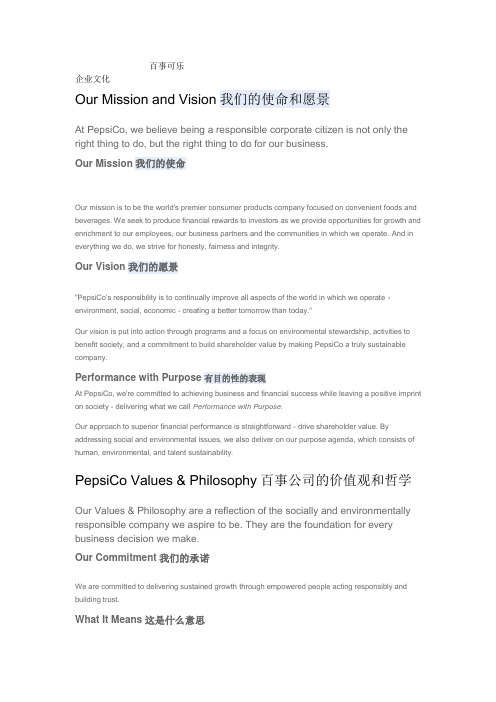
百事可乐企业文化Our Mission and Vision我们的使命和愿景At PepsiCo, we believe being a responsible corporate citizen is not only the right thing to do, but the right thing to do for our business.Our Mission我们的使命Our mission is to be the world's premier consumer products company focused on convenient foods and beverages. We seek to produce financial rewards to investors as we provide opportunities for growth and enrichment to our employees, our business partners and the communities in which we operate. And in everything we do, we strive for honesty, fairness and integrity.Our Vision我们的愿景"PepsiCo's responsibility is to continually improve all aspects of the world in which we operate - environment, social, economic - creating a better tomorrow than today."Our vision is put into action through programs and a focus on environmental s tewardship, activities to benefit society, and a commitment to build shareholder value by making PepsiCo a truly sustainable company.Performance with Purpose有目的性的表现At PepsiCo, we're committed to achieving business and financial success while leaving a positive imprint on society - delivering what we call Performance with Purpose.Our approach to superior financial performance is straightforward - drive shareholder value. By addressing social and environmental issues, we also deliver on our purpose agenda, which consists of human, environmental, and talent sustainability.PepsiCo Values & Philosophy百事公司的价值观和哲学Our Values & Philosophy are a reflection of the socially and environmentally responsible company we aspire to be. They are the foundation for every business decision we make.Our Commitment我们的承诺We are committed to delivering sustained growth through empowered people acting responsibly and building trust.What It Means这是什么意思Sustained Growth is fundamental to motivating and measuring our success. Our quest for sustained growth stimulates innovation, places a value on results, and helps us understand whether today's actions will contribute to our future. It is about the growth of people and company performance. It prioritizes both making a difference and getting things done.Empowered People means we have the freedom to act and think in ways that we feel will get the job done, while adhering to processes that ensure proper governance and being mindful of company needs beyond our own.Responsibility and Trust form the foundation for healthy growth. We hold ourselves both personally and corporately accountable for everything we do. We must earn the confidence others place in us as individuals and as a company. By acting as good stewards of the resources entrusted to us, westrengthen that trust by walking the talk and following through on our commitment to succeedingtogether.Guiding Principles指导原则We uphold our commitment with six guiding principles.We must always strive to:1. Care for our customers, our consumers and the world we live in.We are driven by the intense, competitive spirit of the marketplace, but we direct this spirit towardsolutions that benefit both our company and our constituents. Our success depends on a thorough understanding of our customers, consumers and communities. To foster this spirit of generosity, we go the extra mile to show we care.2. Sell only products we can be proud of.The true test of our standards is our own ability to consume and personally endorse the products we sell.Without reservation. Our confidence helps ensure the quality of our products, from the moment we purchase ingredients to the moment it reaches the consumer's hand.3. Speak with truth and candor.We tell the whole story, not just what's convenient to our individual goals. In addition to being clear, honest and accurate, we are responsible for ensuring our communications are understood.4. Balance short term and long term.In every decision, we weigh both short-term and long-term risks and benefits. Maintaining this balance helps sustain our growth and ensures our ideas and solutions are relevant both now and in the future. 5. Win with diversity and inclusion.We embrace people with diverse backgrounds, traits and ways of thinking. Our diversity brings new perspectives into the workplace and encourages innovation, as well as the ability to identify new market opportunities.6. Respect others and succeed together.Our mutual success depends on mutual respect, inside and outside the company. It requires people who are capable of working together as part of a team or informal collaboration. While our company is built on individual excellence, we also recognize the importance and value of teamwork in turning our goals into accomplishments企业管理Corporate Governance公司治理PepsiCo has adopted strict corporate standards that govern our operations and ensures accountability for our actions. Learn more about the processes and policies guiding our business.Policies政策As one of the world’s leading food and beverage companies, public policy affects PepsiCo’s ability to operate a successful business, and continue to provide shareholder value. For this reason, we believe that active participation in public policy is essential and appropriate for companies in open societies.Management Approach管理办法Overview and StrategyPepsiCo has the world's largest portfolio of billion-dollar food and beverage brands, including 22 different brands that each generate more than $1 billion in annual retail sales. As well as our corebrands—Pepsi-Cola, Lay's, Quaker Oats, Tropicana and Gatorade—we make hundreds of othernutritious and delicious, convenient and fun foods and drinks that bring joy to our consumers in more than 200 countries worldwide. With annualized revenues of approximately $60 billion, approximately 294,000 of PepsiCo's associates are united by our unique commitment to sustainable growth, called "Performance with Purpose."By dedicating ourselves to offering consumers a broad array of choices for healthy, convenient and fun nourishment, reducing our environmental impact, and fostering a diverse and inclusive workplace culture, PepsiCo balances strong financial returns with giving back to our communities worldwide. In recognition of our continued sustainability efforts, PepsiCo was named for the fourth time to the Dow JonesSustainability World Index (DJSI World) and for the fifth time to the Dow Jones Sustainability No rth America Index (DJSI North America) in 2010. For the second year in a row, PepsiCo was the topperformer in the Beverage Sector.For PepsiCo, the benefits of global expansion include: maximizing growth potential, gaining global scale and achieving geographic diversity. Emerging markets account for a notable portion of PepsiCo'srevenue. With faster population and GDP growth than in developed countries, emerging marketsrepresent a significant opportunity for PepsiCo to continue to grow. PepsiCo's business development strategies for emerging markets are focused on:Distributing global brands while ensuring local relevancePepsiCo strives to create products that appeal to local tastes and needs, promoting our global brands and our innovation and operational capabilities. In markets around the world, our R&D teams workclosely with local master chefs to tailor our products to local tastes and consumption patterns and to leverage these insights to launch flavors that make our global brands the local favorites.Examples of this include our Lay's offering with red-caviar flavor in Russia; Kurkure extruded snacks in India based on local, traditional flavors; expansion of Mirinda carbonated soft drinks in the Middle East with the addition of locally inspired tam arind flavor; the launch of Aliva, a biscuit that combines wheat and lentils in India; Cao Ben Le ('happy herb')–branded beverages incorporating traditional Chinesemedicinal herbs in China; and Nimbooz, a beverage made with real lemon juice, in India.∙Creating affordable products that meet consumer needsRevenue management is a significant part of our strategy to ensure our products are affordable and offer good value to consumers in emerging markets, many of whom have limited disposable income. We strive to create products with the right price points and package sizes that offer great consumer value and allow PepsiCo to compete effectively in the marketplace. In some markets, we are inventing brands andbusiness models to create products that meet the needs of lower-income consumers, such as our Lucky snacks product line in Brazil targeting low-income consumers sold through street vendors. And in India, we established a joint venture with the Tata Group in the fourth quarter of last year, to focus on low-cost beverages; the first product from this venture, a glucose-based non-carbonated beverage, was rolled out in early April 2011, at the price of 5 rupees, or the equivalent of 11 cents.∙Strengthening advantaged local supply chain and go-to-market capabilitiesPepsiCo enjoys superior technologies, including advantaged potato varieties, which are a keycompetitive advantage that leads to superior tastes and production efficiency. We work with localsuppliers and farmers to share best practices and maximize results. In China, for example, we introduced proven environmentally friendly irrigation and crop rotation practices that save water and help local farmers grow thriving crops.We build advantaged systems in emerging markets that offer the widest reach to customers andconsumers. We rely on DSD (direct store delivery) expertise and leverage a variety of go-to-market systems to reach a broad set of customers and consumers, both in organized and traditional trade channels. Importantly, in 2010, in markets such as India, China and Russia, among others, we increased our investment with the placement of coolers and addition of new routes and distribution capacity ahead of growth.In many of our emerging markets today, we have integrated "Power-of-One" operating systems in areas such as procurement, customer selling and IT. With the acquisition of our anchor bottlers PBG and PAS in 2010, in key markets such as Russia and Poland, we are now able to build an even stronger supply chain and go-to-market capability, through broader distribution coverage and more joint consumer and in-store activation programs.∙Encouraging people to live balanced and healthy livesPepsiCo is committed to offering consumers a range of enjoyable and wholesome foods and beverages. Our portfolio offers products for when consumers want to treat themselves, and we are also actively developing healthier snacks and beverages for health-conscious consumers.To that end, we established the Global Nutrition Group in 2010 to centralize the innovation a nd development of healthier, wholesome and tasty products. And our recently completed acquisition of Wimm-Bill-Dann in Russia, with a vast array of dairy and juice offerings, accelerates our growth inGood-For-You products and makes PepsiCo the number-one foods and beverage company in Russia.And, as part of our mission to help people lead healthier lives, we support programs across the world, including Vive Saludable Escuelas in Latin America and our Get Active program in India.组织结构百事公司总体上可分为五个组织PERFORMANCEOrganizational ResponsibilityWith its strong leadership team, PepsiCo maximizes shareholder value and invests in entities that ensure sustainable profitability. We have created the Performance Sustainability Leadership Team (PSLT), which informs our Sustainability Steering Committee (SSC) on financial performance, strategy and goals. To find out more about our sustainability governance structure, please go to Sustainability Leadership.Goals and CommitmentsOur performance goals focus on a series of long-term targets, which also are aligned with our short-term needs. To deliver superior, sustainable financial performance, we will continue to put emphasis on innovation and broaden our portfolio through mergers and acquisitions.HUMANOrganizational ResponsibilityThe development of the global R&D structure and appointment of our first chief scientific officer (CSO) has enhanced our relationships with world-renowned academic and research-based organizations. PepsiCo continues to evolve its approach to systematically obtaining policy and scientific advice.The Scientific Advisory Board (SAB), which was created in 2010, reports to the company's CSO. This structure provides long-term research advice to our team of scientists, especially with regard to critical challenges and opportunities related to the transformation of our product portfolio.In terms of product quality and safety, PepsiCo Quality professionals assess product compliance with our policy. PepsiCo's Quality Policy is focused on processes and procedures supporting quality policies and prioritizing critical risk areas. Our Quality agenda is led by Quality professionals in various regions whooversee the following areas: food safety, innovation (R&D), manufacturing quality, co-manufacturing quality, supplier quality and plant quality.Regionally, advisory boards in China, the U.K., Mexico, Brazil and India help guide our efforts in health and wellness, food safety, regulatory compliance and innovation.Goals and CommitmentsIn line with our efforts to help improve the well-being of people in both developed and developing countries, we are focusing our work on the products we make, and on key policies and partne rships, to help us address global nutrition challenges.Training and AwarenessEach functional department identifies training needs and provides training for all associates, including full-time, part-time, temporary and contractors. This ensures they have the appropriate level of education, experience and training necessary to effectively perform the required activities specified in the PepsiCo Food Safety Policy. Training business plans are established to address food safety training for Hazard Analysis and Critical Control Points (HACCP), allergen management, low-acid manufacturing, good manufacturing practices (GMP), control of nonconforming product, associate safety, food security and specific job applications.ENVIRONMENTOrganizational ResponsibilityWe govern implementation and execution of the PepsiCo Environmental Policy through our Environmental Sustainability Leadership Team (ESLT), the PepsiCo Environmental Compliance Council (ECC) and Environmental Sustainability Council (ESC). These councils are made up of environmental representatives from across PepsiCo's operating divisions, bottlers, purchasing, communications and legal departments.The ECC oversees the implementation of a global Environmental Management System (EMS) to standardize and consolidate our existing environmental management software solutions into a single, enterprise-wide solution. The ECC and ESC report to the PepsiCo Environmental Sustainability Leadership Team.The ESLT has chartered two councils in addition to the ECC and ESC: The Sustainable Packaging Council (SPC) and the Sustainable Agriculture Council (SAgC). These councils are made up of subject matter experts from each of our business units and meet regularly to drive PepsiCo performance and provide governance for our sustainable packaging and agricultural commitments.To find out more about our sustainability governance structure, please go to Sustainability Leadership.Goals and CommitmentsTo guide our environmental initiatives, we are focusing our work where we can make the most positive impact—primarily on the issues of water, packaging, climate change, waste elimination and agriculture—and on key policies and partnerships to help address the world's environmental challenges.Training and AwarenessOur environmental stewardship policies and expectations are communicated to our associates, business partners and other stakeholders through our PepsiCo Global Corporate Environmental Policy, Sustainable Agriculture Policy, the PepsiCo Employee Code of Conduct and PepsiCo Supplier Code of Conduct.TALENTOrganizational ResponsibilityThe Talent Sustainability Leadership oversees programs concerning associate relations, engagement, diversity, compliance and health and safety. PepsiCo's Global Diversity and Inclusion Governance Council is composed of internal and external thought leaders and is co-chaired by our chairman/chief executive officer and our chief diversity officer. And we have established Diversity and Inclusion Councils in all four continents of PepsiCo's International business.We also have a Health and Safety Leadership Council (HSLC), with members from across all businesses. For ethics and compliance, issues or violations are handled by the Human Resources and the PepsiCo Law departments.Goals and CommitmentsWe constantly invest in our associates—PepsiCo's greatest assets—to motivate and encourage them to be as productive and creative as possible in carrying out their responsibilities and to become the leaders of tomorrow. Our Talent initiatives include enabling our associates to thrive in a diverse, inclusive culture; providing a safe and empowering workplace; providing opportunities that strengthen our associates' skills and capabilities; and contributing to better living standards in the communities we serve.SOURCINGOrganizational ResponsibilityThe PepsiCo Sustainable Agriculture Council (SAgC) is led by an agro-scientist and includes engineers, sustainability professionals and other agro-scientists from across our PepsiCo businesses. The SAg, part of PepsiCo's overall Sustainability Framework, coordinates priorities and activities and reports to the Environmental Sustainability Leadership Team.To find out more about our sustainability governance structure, please go to Sustainability Leadership. Goals and CommitmentsWe will continuously improve our procurement practices by leveraging our talents, programs and policies across the globe to all associates involved in purchasing functions and decisions.Training and AwarenessPepsiCo's Environmental Policy and Sustainable Agriculture Policy are global, covering all of our regions and business units. Where PepsiCo has direct influence over agricultural operations, we implement specific programs and measurement processes to improve overall performance. When PepsiCo's influence is through third parties or contracted agents, we work with these partners to improve and embed best practices into their operations. Business unit and regional policies also exist to articulate specific programs that are of critical importance to that commodity or brand. Whenever these specific programs exist, they cover 100 percent of activities for that business unit. In addition, we conduct Supplier Summit events to engage with our supply chain.。
PepsiCo百事可乐
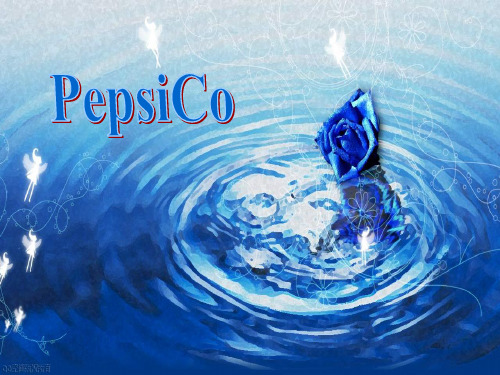
1984年 百事可乐,新一代的选择。 The choice of a new generation 1998年 渴望无限 Ask for More 2004年 突破渴望 (Dare for More) 敢于第一 (Dare to Be No.1) 2012年 把“乐”带回家
The original stylized Pepsi-Cola logo
PepsiCo produces and markets below products in China: Pepsi-Cola, Mirinda, 7UP, Mountain Dew, Gatorade, Dole, Ice Pure Water, Tropicana, Herbal Life, etc. 百事公司在中国经营的主要品牌包括:百事可乐、美年达、 七喜、激浪、佳得乐、都乐果汁、冰纯水、果缤纷(纯果乐) 果汁、草本乐等等。
Its principal businesses include: Frito-Lay snacks, Pepsi-Cola beverages, Gatorade sports drinks, Tropicana juices and Quaker foods.
公司的主要业务包括菲多利休闲食品、百事可乐饮料、佳得乐运动饮料、 纯果乐果汁和桂格麦片食品。
1940s advertisement specifically targeting African Americans
Pepsi logo (2003–2008).
Brand Spokesman
Product strategy
多元化的品牌策略(Diversified brand strategy)
Coca Cola Co. and PepsiCo. So who comes out on top?
- 1、下载文档前请自行甄别文档内容的完整性,平台不提供额外的编辑、内容补充、找答案等附加服务。
- 2、"仅部分预览"的文档,不可在线预览部分如存在完整性等问题,可反馈申请退款(可完整预览的文档不适用该条件!)。
- 3、如文档侵犯您的权益,请联系客服反馈,我们会尽快为您处理(人工客服工作时间:9:00-18:30)。
Analysis of subsidiary combination
A:Flohr Tore B:Pepsi-Cola C:Baer sandwich D:Pizza hut E:KFC
百事公司拥有15个销售额超10亿美元的国际著名品牌
14 11 11 16 18 19 22
156
23 31 41 43 50
Pepsi百事可乐 Mountain Dew激浪 Diet Pepsi轻怡百事 Lay's乐事 Gatorade 佳得乐 Tror桂格燕麦 Ruffles 7UP七喜 Cheetos奇多 Mirinda 美年达 Lipton Teas立顿茶
Three major departments of Pepsi Co 1993-1996 years of income and capital expenditure
Financial
The Company employs approximately 285,000 people worldwide, and its products are sold in approximately 200 countries. PepsiCo hasinvested more than RMB8 billion in establishing 22 drink bottling plants and one concentrate plant in 21cities all over China. 业务范围遍及世界上近200个国家,雇有员285,000 人。公司2009年销售额近600亿美元。百事已在中 国21个城市设立了22家饮料灌装厂和1家浓缩液厂, 投资总额超过80亿元人民币美元。
Snack industry
high
Beverage industry hotel industry
middle
Industry attractiveness 行业吸引 力
low
strong
middle
weak
Competitive edge竞争强势
Thank you!
In November 2008, PepsiCo announced an investment of USD 1 billion in China in next four years. The PepsiCo Inc series of products has 18 brands with annual sales of more than $1000000000 . In the past five years, Pepsi in China were turned over to the state taxes more than 4700000000 yuan. 2008年11月,百事公司宣布未来四年内再向中国投资 10亿美元。百事公司的系列产品中有18个品牌的年销 售额都在10亿美元以上。近五年来,百事在中国共上 缴国家利税超过47亿元人民币。
